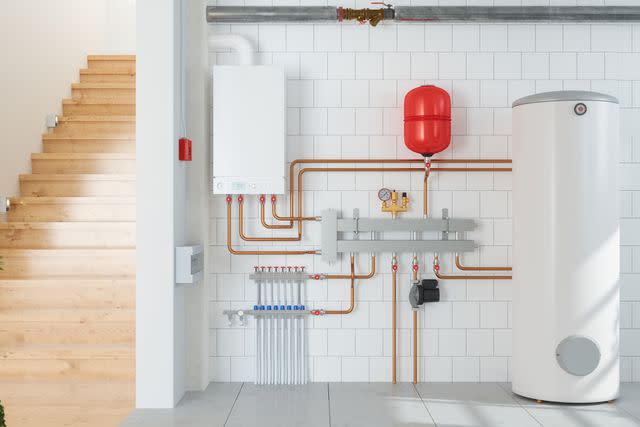Gas vs. Electric Water Heater: How to Choose the Right One for Your Home
When it comes to hot water, is a gas or electric water heater best? These pros and cons can help you decide.
Water heaters are essential home systems. Whether building a new home or choosing a replacement appliance, most homeowners choose between a gas or electric water heater, though a few other options are available.
The question is, how do you choose? The main factors to consider are safety, space availability, convenience, cost, and energy efficiency. Here is a comparison of the two systems to help you choose the right water heater for your home.
Tips
Small dwellings might be limited to an electric water heating system. It requires much less space than a gas water heater.
Gas Water Heater Pros and Cons
As the name suggests, gas water heaters use a gas burner to heat water, which boils and steams to provide hot water for showers and faucets. The most common types of gas are natural gas and propane. Propane is usually more expensive, but it has better heating capabilities than natural gas or electricity.
These appliances are available in tankless and tank-type options. A tank holds a given amount of water at one time, which is then heated to the desired temperature and used as needed. Tankless options do not store the warmed water; they heat the water for use in the moment.

Getty Images / onurdongel
Pros: Gas water heaters have higher heating capabilities than electric heaters, which means they can produce more hot water. They are ideal for larger families with substantial hot water needs throughout the day. They have faster recovery times and can provide hot water during power outages. With proper maintenance, gas heaters can last up to 20 years.
Cons: This heating system tends to have a higher initial cost because it requires gas line installation and a proper ventilation system to offload carbon monoxide. Scientists still debate the environmental impact of gas heaters. Solar and electrical systems might be more sustainable alternatives.
Related: The 9 Best Tankless Water Heaters of 2023
Electric Water Heater Pros and Cons
Electric water heaters are also available in tankless and tank options. Electric systems function using electric coils in a furnace or heat pump. A furnace is energy efficient, but a heat pump might be better in warmer climates because it provides heating and cooling properties through a forced-air system.
Pros: Electric water heaters are less expensive to install because they don’t require the comprehensive ventilation systems that gas models require. They are also safer than gas alternatives, which run the risk of leaks or carbon monoxide poisoning.
Cons: The downside of electric water heaters is that they cannot be used during power outages; they require a reliable electrical connection. Some people complain of high electricity bills too. Compared to gas models, they take longer to heat water.
The Main Differences Between Gas vs. Electric Water Heaters
Cost
An electric heater is usually cheaper to install and maintain. It doesn’t require a vent system or lots of space. Installing a new gas heater is a more costly endeavor. However, over time, the cost of electricity bills for an electric water heater may surpass the initial savings.
Durability
Before making a purchase, many people calculate the cost-to-value based on how long they plan to live in the home. Heater life spans vary by manufacturer and maintenance, but gas water heaters tend to last 15–20 years. Electric water heaters last more than 20 years. Electric heat pumps usually last less than 15 years.
Fuel Source
The main difference between gas and electric water heaters is the fuel source they use for heating. Electric models rely on electricity, while gas models rely on natural gas or propane.
Heating Rate
Gas heaters deliver faster heating and speedier recovery times. Electric rods have a slower heating rate, which can be affected by the water quality in your home. Hard water and sediment build-up can noticeably slow the heating capacity of electric heaters.
Installation
Electric water heaters are quick to install and repair because they don’t require the installation of a gas line and venting or exhaust systems. They are also available in multiple sizes, making them a good choice for installation in smaller spaces.
Maintenance
While both models need regular maintenance, gas heaters require more attention because of the associated health risks of gas leaks. Water heaters require annual flushing to ensure sediment and hard water don’t damage the system. In some areas, a water softener can extend the life of the heater.
Which Is Best for You?
The best option for you depends mainly on whether your home already has a gas line installed. If it does, most people continue to use the existing fuel source because a switch can become a costly headache requiring permits and interventions from multiple service providers.
Comparing the two types of heaters shows the pros and cons of both. Your satisfaction with one or the other will likely depend on your family size, budget, and space availability. For example, if you have a large family with a high demand for hot water, the gas heater would be a good choice if you have a home with a basement where the heater can be stored. However, small apartments or condos may only be able to accommodate a small electric heater that can fit in a utility closet or crawl space.
Energy efficiency, utility costs, and wait times for hot water can vary widely and are affected by more than just the appliance. If you have time to decide, do your homework. Check with neighbors in similar-sized households to estimate long-term projections that might affect your satisfaction over the life of the water heater you choose.
Related: 4 Features to Look for When Shopping for Energy-Efficient Appliances
For more Better Homes & Gardens news, make sure to sign up for our newsletter!
Read the original article on Better Homes & Gardens.
